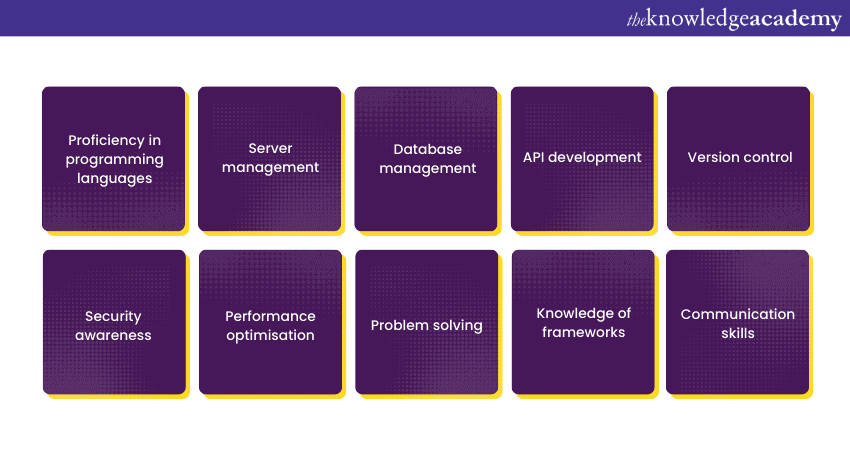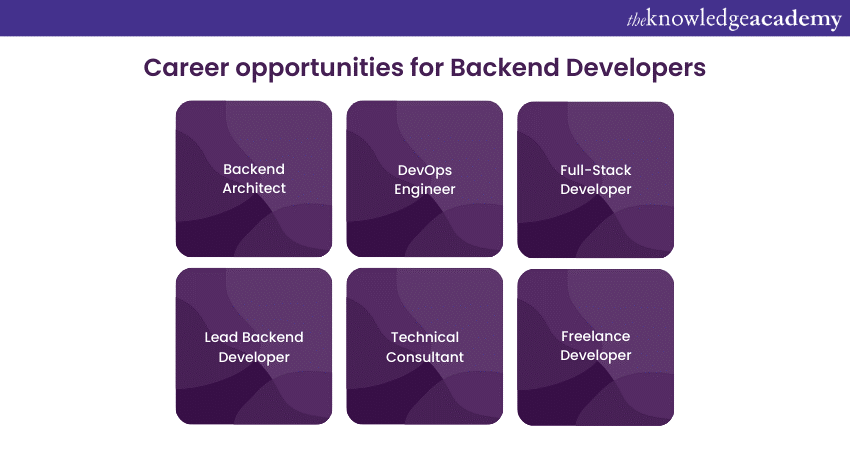We may not have the course you’re looking for. If you enquire or give us a call on +36 18508731 and speak to our training experts, we may still be able to help with your training requirements.
Training Outcomes Within Your Budget!
We ensure quality, budget-alignment, and timely delivery by our expert instructors.

Backend Developer Skills consist of a range of technical and non-technical proficiencies that drive the functionality and efficiency of web applications. These skills help in enabling them to create secure, fast, and reliable digital experiences.
In this blog, we will discuss what backend development is and the top 10 Backend Developer Skills. Read more to get an idea about these skills!
Table of Contents
1) What is Backend Development?
2) Essential Backend Developer Skills
a) Proficiency in programming languages
b) Server management
c) Database management
d) API development
e) Version control
f) Security awareness
g) Performance optimisation
h) Problem solving
i) Knowledge of frameworks
j) Communication skills
3) Conclusion
What is Backend Development?
Backend Development involves creating the part of a website or application that's not visible to users but is crucial for its functionality. It deals with the server, databases, and the logic that processes and manages data.
When you use a website or app, the Backend is responsible for making things happen when you click buttons, submit forms, or interact with the platform. It stores data in databases, retrieves information when needed, and processes your requests. All of this occurs in the background, hidden from the user's view.
Backend Developers are responsible for building and maintaining this hidden infrastructure. They use programming languages, databases, and servers to ensure that the website or app functions smoothly, securely, and efficiently. Their work is essential to provide a seamless user experience, even though it goes unnoticed by most users.
Essential Backend Developer Skills
Backend Developers are experts in the technical side of web development, working behind the scenes to ensure that websites and applications function smoothly. Discussed below are the top 10 Backend Developer Skills one must possess to excel in this profession.

Proficiency in programming languages
Proficiency in programming languages is a fundamental skill for Backend Developers. These developers should have a deep understanding of languages like Python, Java, Ruby, or PHP because these languages serve as the cornerstone of server-side development.
a. Python: Python is highly regarded in the world of backend development due to its simplicity and readability. It's often used for web frameworks like Django and Flask, making it an excellent choice for building the server-side of web applications. Python's versatility allows developers to create robust backends that handle various tasks efficiently.
b. Java: Java is known for its portability and reliability. It's commonly used in enterprise-level applications, where stability and security are paramount. Backend Developers proficient in Java can create scalable and high-performance server applications, making it suitable for larger and more complex projects.
c. Ruby: Ruby is renowned for its elegant and concise syntax, which makes it a popular choice for web development. Ruby on Rails, a web framework built on Ruby, simplifies and accelerates backend development. Ruby's ease of use and developer-friendly features make it an excellent language for creating dynamic web applications.
Server management
Server management is a crucial aspect of Backend Development. It includes a range of tasks aimed at ensuring that servers, the powerful computers that host websites and applications, function efficiently and reliably. Server management includes a lot of components, such as:
a) Configuration: This involves installing the necessary software, setting up security protocols, and establishing the server's fundamental parameters.
b) Maintenance: Regular updates, security patches, and software maintenance are essential to prevent vulnerabilities and ensure smooth operations.
c) Optimisation: This may involve adjusting server settings, resource allocation, and load balancing to handle user traffic effectively.
d) Choice of server technologies: Backend Developers must be well-versed in various server technologies like Apache, Nginx, or Microsoft IIS. Each of these technologies has its strengths and use cases.
e) Load balancing: In cases of heavy traffic, load balancing techniques ensure that requests are distributed evenly across multiple servers.
f) Security measures: Backend Developers implement security measures to protect the server from threats like hacking attempts, data breaches, and denial-of-service attacks.
Elevate your web design skills with our dedicated Website Design Course. Sign up today!
Database management
Backend Developers work with various types of databases, each tailored to specific requirements:
a) Relational databases like MySQL and PostgreSQL are preferred for structured data
b) NoSQL databases such as MongoDB offer flexibility for unstructured data storage
c) In enterprise-level applications, databases like Oracle are chosen for their ability to handle large volumes of complex data
The first critical step in Database Management is the design phase, where developers meticulously plan
a) Database structure
b) Including tables
c) Including fields
d) Defining the relationships between them.
Once the database design is set, implementation takes place, wherein developers create the actual database using SQL or NoSQL queries. They set up tables or collections and define fields to store data accurately. Ensuring database optimisation is the next imperative step, as it impacts the speed and efficiency of data retrieval.
API development
APIs act as intermediaries that enable various software components within an application, or even between different applications, to communicate and interact seamlessly. They set the rules for sending and receiving data, letting the part users see (the frontend) ask the part that processes data (the backend) for information. There are different types of APIs, like RESTful, SOAP, and GraphQL, each with its own way of working.
Backend Developers create APIs to facilitate data exchange between the front and backend of software systems. They define specific entry points (endpoints) for various tasks, such as posting updates or accessing user profiles. Using languages like Python, Java, or Node.js, they write the code that manages
a) Request processing
b) Data retrieval
c) Security measures
This ensures the application functions as intended while safeguarding against potential threats.
Discover the power of GitHub fundamentals and elevate your development skills today. Join our Git & GitHub Fundamentals Course today!
Version control
Version control is essential in software development for tracking and coordinating changes in the code, especially in team projects. It's like having a detailed history of every change made to the code, which helps prevent conflicts, keeps everyone on the same page, and allows for easy collaboration.
Version control systems track code changes, recording what was modified and who did it in a central repository. This allows multiple developers to collaborate by integrating these changes into their work, like a shared blueprint. It keeps the project on track and in sync, even if developers are working on different code sections.
Security awareness
Security awareness is a critical aspect of web development, especially for Backend Developers. It revolves around ensuring that websites and applications are safe from cyber threats and unauthorised access. It includes:
a) Data protection
b) Secure authentication
c) Vulnerability protection
Security awareness for Backend Developers is all about keeping data safe, letting the right people in, and safeguarding the application from sneaky digital threats. It's like putting up strong walls and locks to protect a valuable treasure from potential intruders.
Performance optimisation
Performance optimisation is a crucial aspect of Backend Development, emphasising the need for web applications to run smoothly and efficiently. Backend Developers play a significant role in achieving this by making sure that the code, databases, and servers are finely tuned to deliver swift responses and handle a large number of users. They play a crucial role in providing:
a) Code efficiency
b) Database optimisation
c) Server performance
d) Caching
e) Minimising downtime
f) Scalability
The end result is a web application that runs swiftly and efficiently, providing a positive user experience and keeping users engaged.
Problem solving
Problem solving is a fundamental skill for Backend Developers, as they are responsible for ensuring the smooth operation of a web application. This skill involves
a) Identifying
b) Analysing
c) Resolving complex issues that may arise in the server-side code.
Problem solving skill for Backend Developer is important for:
a) Issue identification: Backend Developers pinpoint problems by scrutinising code, configurations, and logs, similar to detectives searching for clues.
b) Analysis: They delve deep into the issue, tracing data flow and examining code, like solving a puzzle to reveal the root cause.
c) Resolution: Backend Developers use technical skills and creativity to fix problems by debugging code, adjusting settings, or enhancing security.
d) Testing: After implementing solutions, they rigorously test to ensure the issue is fixed without introducing new ones.
e) Documentation: Developers record the issue, steps taken, and lessons learned for future reference and team knowledge.
Knowledge of frameworks
Knowledge of frameworks is a significant advantage for Backend Developers, as these tools play a crucial role in simplifying and optimising the development process. Frameworks, like Ruby on Rails, Django, or Express.js, provide a structured and organised foundation for building web applications.
a) Streamlined development: Frameworks provide blueprints that save time by offering pre-built modules for common web tasks.
b) Consistency and best practices: They ensure code follows established standards and methodologies, improving teamwork and code quality.
c) Security features: Frameworks include built-in security measures, enhancing data protection and reducing security risks.
d) Efficiency: They automate repetitive tasks, boosting developer productivity and speeding up web app development.
e) Community and support: Frameworks have supportive communities and comprehensive documentation, aiding developers in problem-solving and staying updated.
f) Customisation: Developers can customise projects while benefiting from the framework's foundational structure.
g) Scalability: Frameworks are designed for handling growth, making it easier to expand applications as the user base increases.

Communication skills
Communication skills, although not immediately associated with the technical perspective of Backend Development, play a pivotal role in ensuring the success of a web project. Backend Developers must effectively communicate and collaborate with various team members, including frontend developers, designers, and project managers, to create a seamless and functional web application.
Communication skills are important for:
a) Collaboration: Ensuring backend and frontend developers work in harmony
b) Understanding user needs: Grasping user expectations and aligning with design
c) Translating technical jargon: Simplifying complex tech terms for non-tech colleagues
d) Problem-solving: Addressing issues together through clear communication
e) Project management: Keeping the team informed about progress and challenges
f) Feedback and iteration: Continuous improvement through effective feedback
g) Documentation: Creating a user manual for code and processes
h) Client communication: Explaining tech to clients in understandable terms
Conclusion
These 10 skills discussed in this blog, ranging from coding proficiency to effective communication and problem-solving, serve as the foundation for creating digital experiences that not only meet but exceed user expectations. As technology continues to evolve, Backend Developers equipped with these skills remain at the forefront of delivering innovative and efficient solutions. Hope you enjoyed reading the blog.
Unlock your full potential in web development with our comprehensive training courses on App & Web Development Training. Join now!
Frequently Asked Questions
Upcoming Programming & DevOps Resources Batches & Dates
Date
 Mobile App Development Training Using Flutter
Mobile App Development Training Using Flutter
Fri 7th Feb 2025
Fri 4th Apr 2025
Fri 6th Jun 2025
Fri 8th Aug 2025
Fri 3rd Oct 2025
Fri 5th Dec 2025







 Top Rated Course
Top Rated Course



 If you wish to make any changes to your course, please
If you wish to make any changes to your course, please


